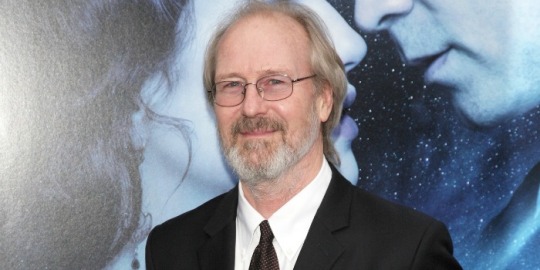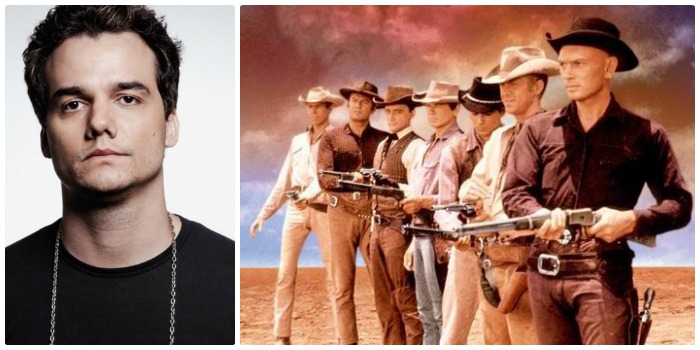William Hurt lamentou a morte do diretor Hector Babenco ocorrida na última quinta-feira (14). O ator venceu o único Oscar da carreira pelo trabalho “O Beijo da Mulher-Aranha”, em 1986.
No filme dirigido por Hector Babenco, o ator interpreta Luis Molina, um homossexual que foi preso por comportamento imoral em um país da América do Sul. Para escapar da realidade ao qual o cerca, ele inventa filmes românticos ao lado do parceiro de prisão Valentin Arregui que busca se manter mais ligado à realidade.
Procurado pela TV Globo, William Hurt enviou um email à emissora na qual lamentar a morte do cineasta argentino naturalizado brasileiro. “Hector foi, pelo nosso trabalho em ‘O beijo da mulher aranha’, o melhor diretor com quem já trabalhei. Eu estou tão triste hoje. Por outro lado, tão feliz“. “Hector está aqui, agora. Ninguém de quem lembramos morre. Algo se vai, sim. Mas não a essência”, disse.
“Mas Hector foi o condutor quando me senti mais integralmente um ator de cinema”, observou, mencionando a “proximidade da colaboração” do cineasta com os atores, “a ética de trabalho inequívoca”.
Hurt comenta que Babenco “era temperamental e tinha orgulho disso”. “Ninguém se importava. Ele era honesto com seus sentimentos e isso era maravilhoso”, escreveu. “Arte e talento são suor. Ele dividiu isso de pessoa a pessoa. Abençoado seja. Abençoado seja por toda essa experiência.”
O ator também se lembrou das filmagens de “O beijo da mulher aranha” em São Paulo e a companhia de Raul Julia (1940-1994). Em outra passagem, comentou seu encontro com Fernando Ramos da Silva, o ator que estrelou “Pixote: A lei do mais fraco” (1981) e morreu poucos anos depois assassinado por policiais.
“Passamos algumas boas horas juntos. Eu pensei ‘este é um dos meus pais artísticos’. Ele era mais novo do que eu, mas por outro lado era mais velho. Ele tinha passado por tanta coisa. Mas elas mudam o mundo, eu acho, essas belas pessoas e Hector. Fernando morreu não muito depois. Então, por causa de Hector, lutei pelas causas certas, justiça e caráter”, comentou Hurt.
Por fim, ele conclui: “Tirando ter filhos e encontrar seu amor verdadeiro, não há nada melhor do que ter tido a chance de expressar-se a si mesmo em boa companhia, no ofício que você teve sorte o suficiente para encontrar, aprender e transmitir. Hector, que sua passagem para o paraíso seja tão imediata e apaixonada como foi a de Manuel [Puig, autor do livro que inspirou o filme], Raul [Julia] e Leonard [Scharader, roteirista].”
Leia a carta na íntegra:
Hector was, for the time we worked on “Kiss of the Spider Woman,” the best director I ever worked with – in two most especial and essential areas of our actors’ art: the basic tactile aspect of character creation (the craft of actor fundamentals) and flagrant passion for theme. Fundamentally, the origins of origins are the questions, themselves. How we ask them and who we ask them among are the keys to the mystery. Actors’ questions are the same questions as those of historians, scientists, doctors, lawyers, the questions that try to grasp reality. Acting is real. It’s not fakery. It’s research, observation, invention, interpretation, and sharing the process of learning.
No other in my experience, in his position as director-facilitator, of the theatrical ensemble architecture, has reached down as deeply into the basic earth of our particular skill, the world of “characterization in ensemble” (acting’s pinnacle). Acting is not a matter of show-n-tell but of action and transformation. No one in my film experience has grasped this in as gritty and basic an understanding as Hector did on “Spider Woman.”
I am so sad, today.
Yet, so very glad.
“Show me with whom you walk and I will tell you who you are.”
Life is about great company.
To share time in “conversation” with sensitive, brave beings is the apex of consciousness.
In a living consciousness, they do not die. It cannot happen. Hector is here, right now. No one we remember dies. Something passes, yes. But not essence.
It’s saying a great deal about him, how highly I think of him, because I have been amazingly blessed, as an actor, to have worked with truly awesome directors. And I have been, also, as happily humbled in the company of many other artists.
A few other directors were to me, perhaps, in sum, over longer durations of accumulated collaborative effort, as a matter of continuity, sheer talent and of richness of themes, as meaningful. None as singularly. I speak, among others but primarily, of Lawrence Kasdan in film and Marshall Mason in stage work.
But, Hector was the driver when I felt most completely to be an actor in film, glad to be one of the oxen yoked to the plow, glad to be putting one foot in front of the other on that field, because of the combination of character and theme audacity, the closeness of collaboration, the inspiration, the unequivocal work ethic, and the complexity and the focus with which he ‘guided’ by allowing us to ‘go there.’ He trusted us. We deserved that. And, he knew how to help us, gave us permission to work, enjoyed making that space for all of us. And if (when) we (of course) challenged him, he never flinched or fled. What a gift that is. He stood with us. He honored us. All of us.
He somehow had the knack – he knew where we were leaning. Condoned it. There are things you cannot say in descriptive words, especially as you get nearer the “action” zone. You can’t say, “I think I’ll make it a bit more … “ this or that, whatever. You have to leave adjectives behind, at some point. Get them out of your head. All you can do is flick a half a millimeter of an eyelash bat in a certain direction or grunt and hope the director sees where you want to go hunting for the scene, this time. He saw.
We stationed ourselves, me and Raul, at a small table right close next to the platform all the jail scenes were filmed on. We only had one 50 mm lens for the whole movie, I think. That’s hard if you insist on having another actor’s eyes, no matter what, to play off. The matt box is wide in closeups and swings the on-screen actor’s eyes way out to the side. Hector and I used to fight about it, but he always let me squeeze it in. He was contradictory for the sake of siphoning off anxiety.
I remember, Raul and I would play chess (he always won; I can’t think about anything but acting when acting; Raul was a multi-tasker) and Hector, as he slid between us and the platform on his way to and fro from wherever to wherever, would suddenly stop and swivel in a flash gesture, like a dramatic sudden pivot move by a ballet dancer, and shove his face close between ours and say, in a hoarse whisper loud enough to be heard around the block, “what do you say if we try …..” …. and he’d line it up. We would not speak but would look at each other and just quietly get back to the game. He would act huffy and off he’d go. When we got to the scene, we’d try it. Mostly, it worked.
We weren’t afraid to be naked about feeling.
Hector wasn’t in the least shy about scrapping.
He was temperamental and proud of it.
No one minded. He was Argentinian. Not the only emotional people on the planet.
He was honest with his feelings and it was wonderful.
To do all he knew, though, he had to recognize us for what we are, what we do, how we think and see. Actors think with their bodies. Another great ability of his was how quiet he was during a take. Great directors are great listeners. Actors minds are in their skins. They have to be granted space and time to think out loud with that mind. The body. Someone needs to hear that version of expression. To be recognized for one’s potential, trusted and permitted to release it, is the greatest gift an actor can receive.
I have so often wondered where he learned it, the basic rules of actors. It’s not about stuffing egos; it’s about risking emotional exposure of ideas and physicalizing them. Few do really understand it because of the unfair lack of education offered (everywhere, in everything – humanity’s shame).
Acting is a craft the way whittling wood is. It’s about “grounding,” “history of character,” reading the newspapers, studying other arts and sciences, “sensory awareness,” “remaining true to given circumstances,” travel, physical dexterity, liberal arts, vocational education, all education, about maintaining structure while riffing, folding all those into thematic questions, about the craft of really “not-knowing” but yet keeping others safe, thorough studying, how to explore yet without bulling around in China shops, through asking relevant questions through the skills of characterization in ensemble, how revelations can be spontaneously found and shared, on and on …. acting is a craft that can receive as much into it as much as anyone can offer it, ….. and my thought about how Hector got there, to his level of raw understanding of how active it is, has always been … that he received a tremendous amount of wisdom about the difference between the folly and evasiveness of being child-ish and the faith and direct honesty of being child-like when he was in collaboration with the raw street guts and minds of his young actors while creating “Pixote,” another amazing work. He had somehow learned and applied all the understanding about the basics, maybe from some book, somewhere (I really don’t know), rules which are so easy to misplace in the ambition and ostentation of success and its “show” surfaces, in helping those younger actors. The rules are tough. So … he was remarkable.
Very few understand. Then, very soon after “Pixote” (lucky for us), before those basics could be altered or tarnished, he passed the gift of the stability of actually imagining the truth of what other people are experiencing, the basics of acting, to me and Raul and to all of us, in “Spider Woman.” So, what we had, then, was our basic training confirmed, but no worry about success. Fundamentals and no waste on frills.
One thing that helped it was being in Sao Paolo. His personal assistant/driver was a seven foot tall Indian from the jungle. He smoked two huge joints every day and never wavered. I tried two hits once and hallucinated. He never spoke but he grasped the universe. Wherever he was, he was the leader. He watched over.
And the “studio” we had was just simple old factory inventory building. No distractions. The crew he gathered – oh my goodness – what amazing people. Such feeling. On Sundays, I’d gather Raul up and get us both in a cab to sneak out to the studio (not a studio … really, it was a quonset hut). We’d rehearse with the stately Amazonian Indian man sitting guard. There was one light bulb we’d have on in the middle of the stage. The rest of the expanse was dark. One day, I saw a strange little glint in a far corner of the cavernous dark. I shone the light in that direction and it was a shimmer of light reflected from tears falling down a workman’s cheeks. He’d stopped and held still from the moment we’d come in an hour before. He was weeping because he was floored by the fact that “rich” American “stars” would put that effort into something on their day off. He knew the value of time. Many of the crew had exchanged jobs worth more money for the privilege of working with Hector.
When Hector would find out about our forays to the set he’d get very upset and natter about safety and overwork. We grimaced and he’d look at us, half impudent, half worried.
It was real engagement. Sweat and ethics. Sometimes, admittedly, a very rugged effort, but always respectful. Tangible, immediate, and, finally, only kindness. We weren’t worried about who was taking pictures. Nobody was. Nothing to hide. Especially not from the paparazzi. Who weren’t interested in spying on hard work, anyway. It’s boring to them. They want flash.
“What’s wrong with the truth?”
That’s what we said. I say it to my kids, too (they say it, right back).
I had the great joy to meet Fernando Ramos da Silva (the actor who played Pixote) and to thank him. He was shy, had a wonderful humor. We had a very happy few hours, together. I thought, “this is one of my artistic fathers.” He was younger than me though older. He had been through so much. But they changed the world, I think, those beautiful young people and Hector. Fernando passed away not long, after.
So, because of Hector, I got fight for the right causes, fairness and character, to be with Manuel, Len, Raul, Sonia and David and so many others, and never before or after in any single feature film have I experienced the degree of fulfillment from being provided that extent of open hearted collaboration, the undivided permission toward solving theme and character. It was an unusual situation in conjunction with lovely people.
We had absolutely no idea if anyone would like it. It wasn’t that we didn’t care about others’ feelings but that we knew we’d cared to our Nth ability, had given it our all, and that was all we could do.
The precious blue – diving with the whales. Its creativity came from basics. Hector only brought people who were completely ready to go. Everyone knew what the script was about. We ate together. We went to the warehouse on the outskirts of Sao Paolo, together, each day, dug for the scenes, came home exhausted, had a shower, had dinner with our plates to one side and scripts to the other and started digging for the next day’s ideas before dinner was over. Ruthlessly good. Art and talent are sweat. He shared it person to person. Bless him. Bless all of that experience.
Yoga is an interesting word. Of many great meanings. One is, “yoked to one’s meant purpose.” Hector was that, and, we were, too, with him. I simply can never express my love and gratitude to our unconditional, unfettered Hector, and to my beloved friend Raul Julia, to that angel-on-earth (and he was) Manuel Puig, to the seer, Leonard Schrader, to brilliant “Mr. Fairness,” David Weisman, to the whole of it. It was wonderful, good, tough-hard, sinewy, beneficent work. Hector was the hub of that sacred place. A blessed experience, one of the rarest of a lifetime of many rarities.
Many of us involved with Hector are gone from this plane, now, having already joined the precious ones on the other side of Time’s Great Falls.
Except having children and finding your one true love,
There is nothing better than being given the chance to express yourself in good company, in the craft you were fortunate enough to find, to learn, and give away.
Hector, may your ticket to heaven be as immediate and enthusiastic a pass as Manuel’s, Raul’s and Leonard’s.
William Hurt
com informações do site G1
















